Malaysians are obsessed with food. And we totally get it – the entire country is a non-stop feast of delicious food. There are legit 5 meal times in Malaysia – breakfast, lunch, tea, dinner and supper.
Beyond the foodie paradise that is Malaysia, we discovered a lot about this magnificent and super diverse country during our 3-month trip here as a gay couple. But the one uniting thing about all Malaysians is their immense pride in their food! Every Malaysian has strong opinions about where to find the best laksa or from which city you can find the tastiest rendang!
A word of warning to our fellow LGBTQ travellers – it is illegal to be gay in Malaysia. It is an Islamic influenced country, so homosexuality is very much taboo. Therefore it goes without saying you should avoid any acts of activism or public displays of affection here. But having said that, despite the awful anti-gay law, there is a fabulous large LGBTQ community throughout the country, especially in Kuala Lumpur, with a small and underground gay scene. We made a lot of local gay friends throughout Malaysia who we love dearly. It is through their eyes we discovered the gay scene of the country and also the more unique facets of Malaysian culture, which forms the backbone of this article.
These are our 10 interesting facts about Malaysia:
Malaysians are obsessed with food
As foodies, this is one of our favourite interesting facts about Malaysia. Everywhere across the country you'll find hawker stalls selling a range of delicious freshly made foods like laksa, Indian inspired roti canai, the national dish: nasi lemak, and so much more. The entire country is a haven for foodies, particularly Penang which is a melting pot for Indian, Chinese and Southeast influences.
What we loved the most about Malaysia however is how opinionated and passionate Malaysians are about their food! For example, if you were to, say post a photo online (wrongly!) describing Assam Laksa as having coconut milk, god help you! Or, if you describe the type of noodles used in a Mee Kolok wrongly…look out! Malaysian Instagrammers will roast you for this – in a very lighthearted way of course. We love this about them and had a lot of fun learning about each individual food item during our 3-month trip here.
The obsession with food is serious. Remember, this is a country that has at least 5 meals in a day: breakfast, lunch, tea, dinner and supper. There is even a (terrific!) Food Festival every August in Kuching which we strongly advise checking out.
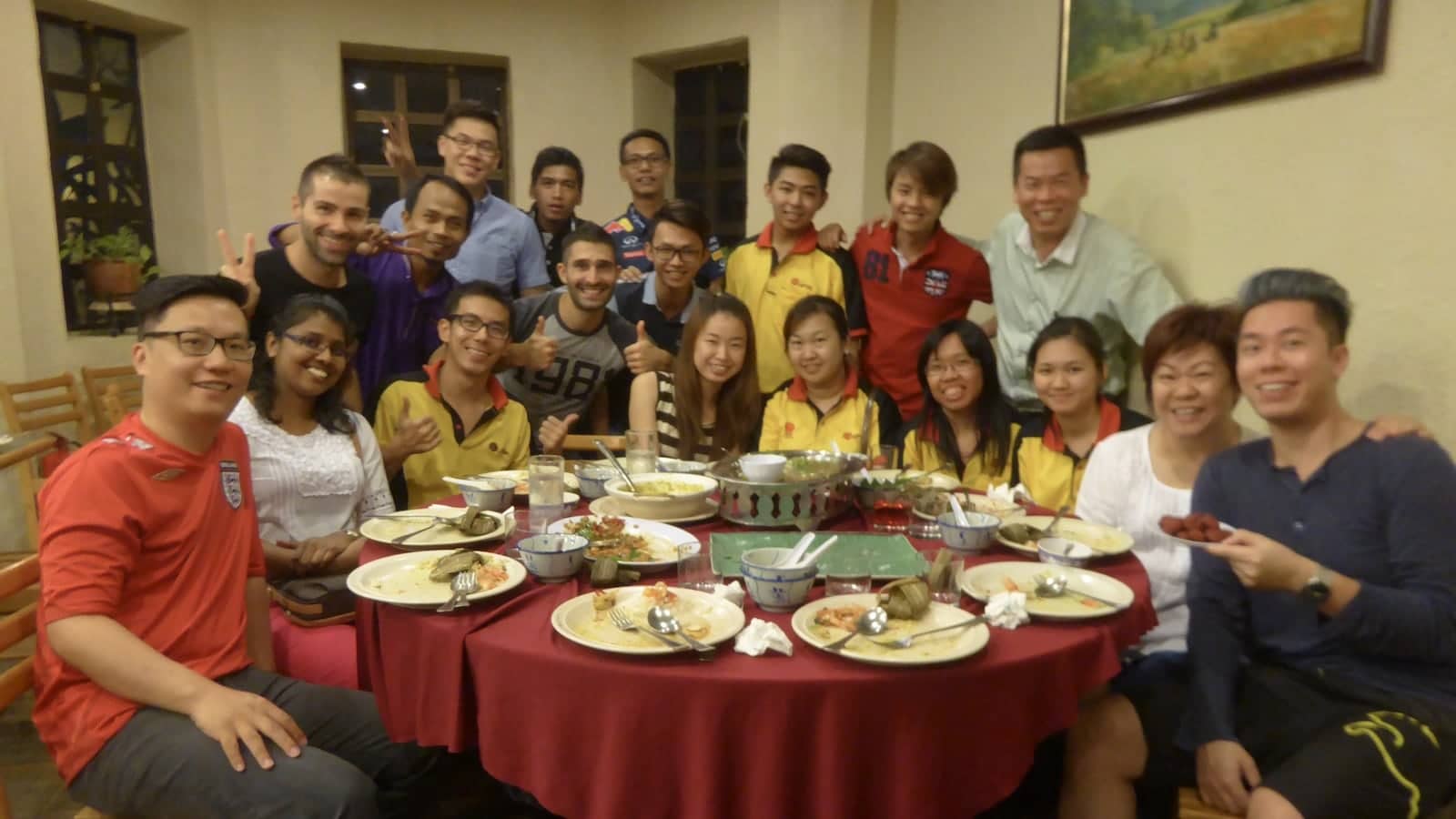
Manglish: using lah in every other sentence
Whenever speaking with our Malaysians friends we'd hear lah thrown in quite a lot, especially after a noun or a subject in a sentence. We sat down a few of them to explain when and how to use lah:
Firstly they told us, “lah” can be used as a Malaysian exclamation. In most situations, you'd be able to use lah to exaggerate a statement. It is also an exclamation of a matter of fact. So for example, if you're really hungry, you could say:
“Go eat lah, what are you waiting for?“
Second, “lah” is an expression of exasperation, for example:
“Why do you keep asking me for money, I don't have extra cash lah!”
Thirdly, “lah” is also used to strongly agree or disagree with someone:
“Yes lah!” or “No lah!”
And to make things even more confusing, in the Sabah province of Malaysia on Borneo island, they use bah instead of lah!
Other quirky Malaysianisms include using the word “already” or “wey” at the end of sentences. These are locally called Manglish and we recommend watching this video to learn more about them and how to use them:
Malaysia is one very diverse nation
One of the most unique interesting facts about Malaysia is that it reminded us a lot of London or New York: people of all races and ethnicities getting along as one. This is perhaps why despite the anti-gay laws in place, we felt more welcome and safe on the streets of Kuala Lumpur than we did in, say, Moscow!
Malaysia is famous for being one of the most multicultural nations in Southeast Asia. It is comprised of 3 main races: Malays, Chinese and Indians. The three main religions are Islam, Buddhism and Hinduism. Other religions such as Sikhism and Christianity are also practised. Muslims are the majority comprising around 67% of the population.
We felt a strong sense of multiculturalism in Malaysia from the moment we arrived. For example, upon entering, we were stamped into the country at immigration by a smiley sweet lady wearing a burkha, welcomed and checked into our Air BnB condo in Kuala Lumpur by a friendly Chinese Malay guy and then served dinner in Little India with strong Indian accents and plenty of head wobbling! This is Malaysia – a melting pot of so many strong cultures merged into one, which is what makes the country so unique and exciting in our opinion.
We thought this photo of 3 of our Malaysian friends from Kuching nicely sums up this very ethnically diverse country:
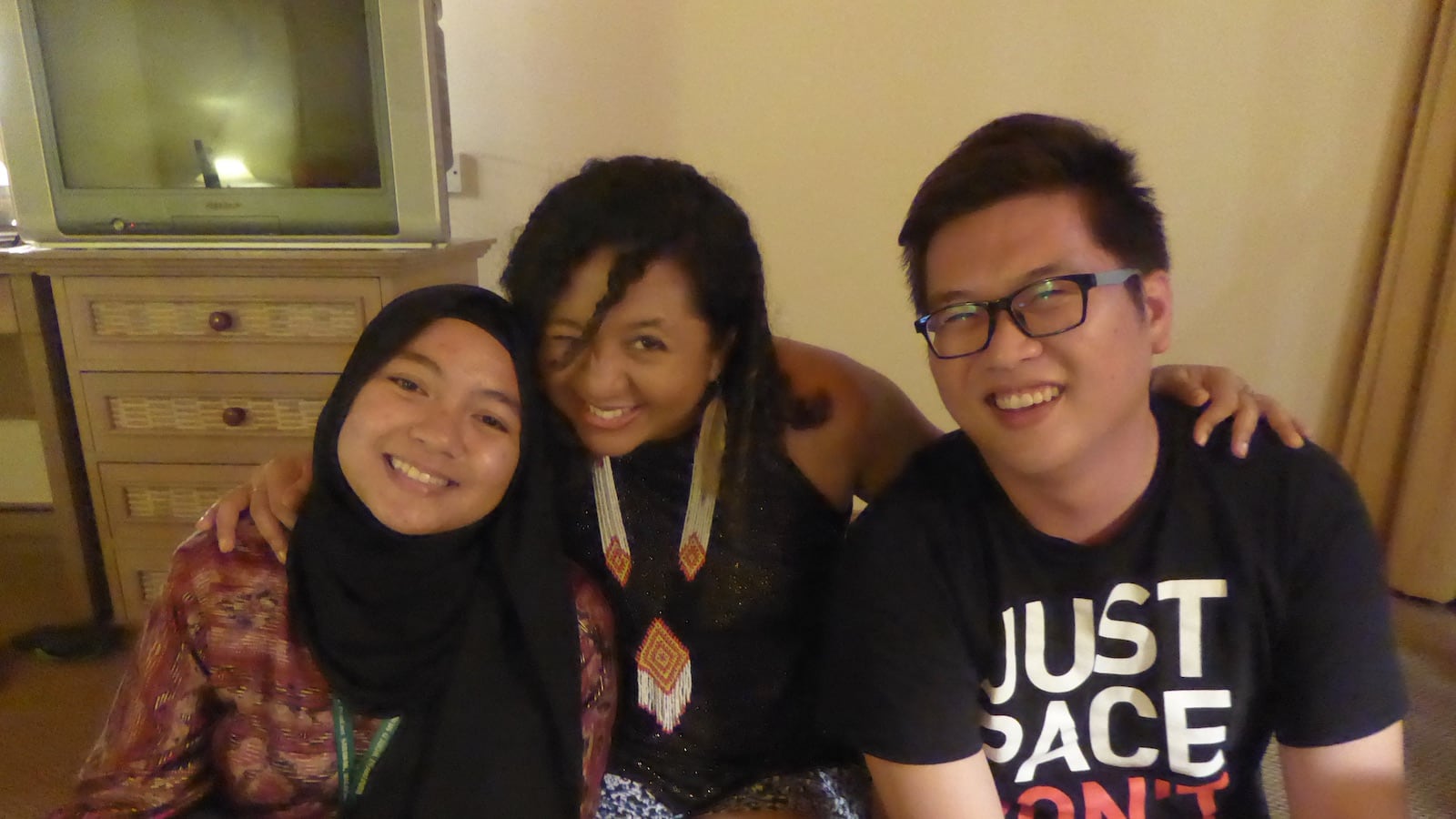
Durian fruit: the King of Malaysian fruits
Durian is the marmite of Asia, loved or hated by all and nicknamed The King of the Fruits. It is also the most, er, potent of our interesting facts about Malaysia!
Durian has such an infamous reputation because of its extremely strong smell and taste. So strong that most public places and hotels across Asia ban them! In Malaysia, durian fruit is one of the most popular fruits. It's serious business here, with many different types like D24, Musang King, Udang Merah (meaning Red Prawn) and Susu (which means milk).
You can also use durian to make ice cream, cheesecake and even durian crème Brulee…
Our opinion?
We are sorry to say (and mean no disrespect to our Malaysian friends!) durian is one of the most disgusting things we've ever tried… Imagine eating something soft that has a strong smell of stale old onions, with a taste not too dissimilar from that! And the smell doesn't go away easily. It's strong, just like onion breath, which stays for hours, no matter how many times you rinse your mouth out with mouthwash! We totally understand why hotels and metro stations across Asia have large signs banning durian.
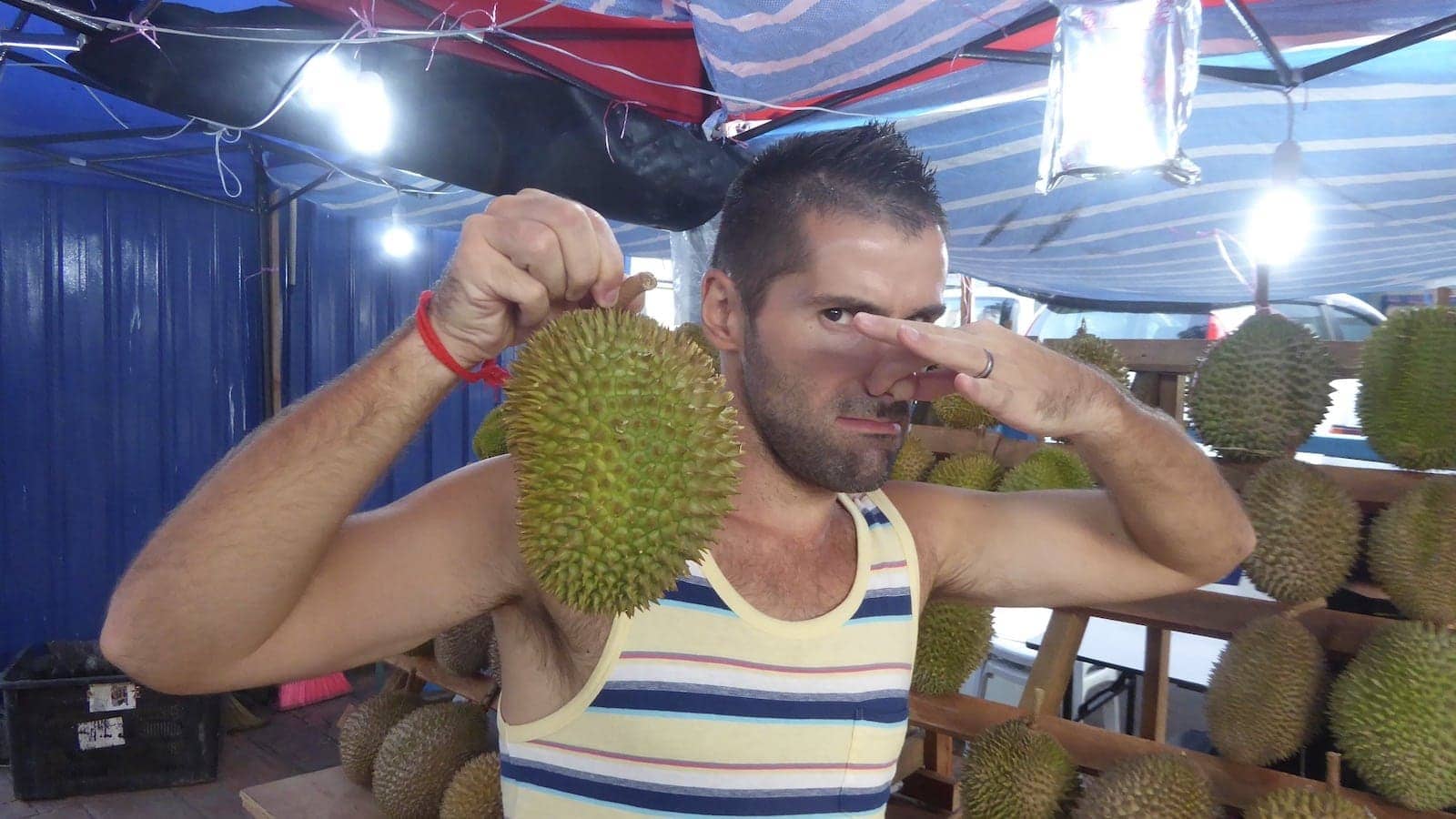
The country of tropical fruits
Durian aside, Malaysia is a country so rich with delicious fruit throughout the year. Malaysia is blessed with a vibrant tropical climate both on mainland Malaysia and on Borneo Island, which means lots of heat and plenty of rainfall all year round.
One of our favourites is mangosteen, nicknamed the Queen of the Fruits! The nickname made us giggle, but when tasting it you realise why – it has a sort of cooling effect, which helps counteract the hot effects caused to your sensed by the durian King.
Other tropical fruits to check out in Malaysia include lonyan (similar to lychee), mangos, jackfruit, dragon fruit, guava, rambutan, lychee, papaya and many more. One fruit which is less tropical (which we can grow back home in the UK) is strawberries! If you visit the Cameron Highlands (around 200km/125 miles) north from Kuala Lumpur, this is one of the most famous places where strawberry fields are in abundance.
On the Borneo island side of Malaysia, you'll even find fruit unique to this area. One particular example is the tarap fruit (also called “marang” in the Philippines). It looks like a cross between durian and jackfruit, but unlike durian it's delicious. So delicious, that it can be used to make a cake or ice cream. We tried tarap in Sandakan, located on the Sabah side of Malaysia Borneo:
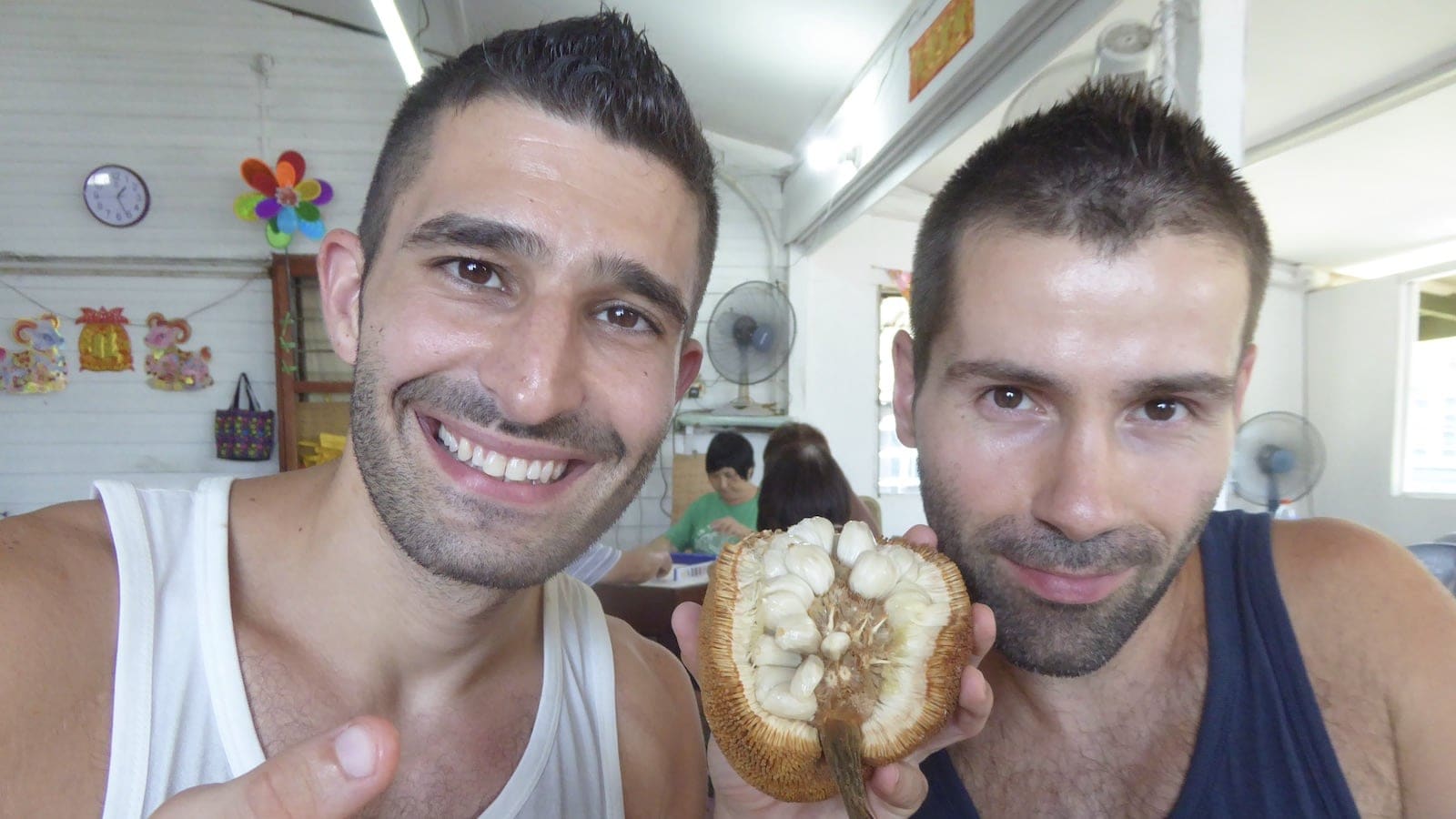
Orang-utans: the man of the Jungle
Orang-utans are native to the island of Borneo. We saw them up close at the Semenggoh Wildlife Centre near Kuching and also in the wild at the Kinabatangan River.
We were amazed at how human-like Orang-utans are with their mannerisms, which makes sense when you realise they have 98% of the same DNA as us.
In Malay, orang-utan means “person of the forest” and the rainforest is indeed their natural habitat. Unfortunately, due to the severe deforestation and logging to the rainforest across Borneo caused by the huge demands of the palm oil industry, orang-utans have become an endangered species.
This is why rehabilitation centres exist across Borneo Malaysia, the Semenggoh Wildlife Centre is the most famous. We highly recommend visiting it to learn more about this beautiful animal, but also to support the efforts of this centre, whose mission is to provide a sanctuary for injured and orphaned orang-utans.
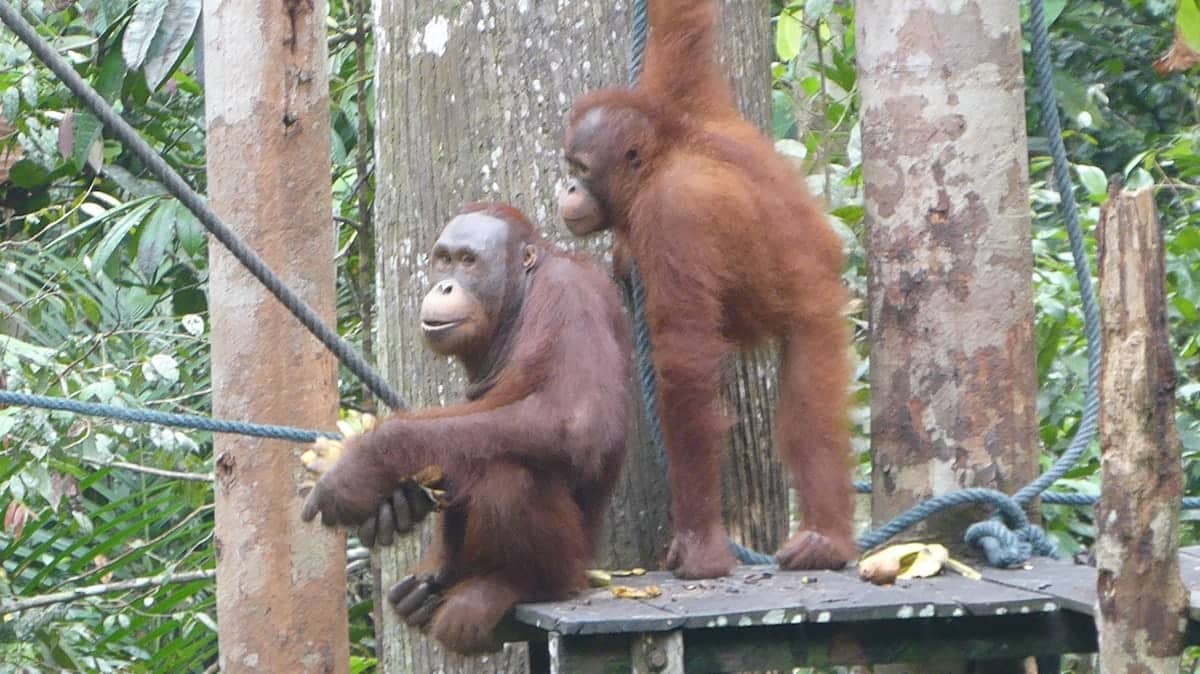
James Brooke: the British raja
There are 13 states in Malaysia, each with their own Governor, Raja or Sultan acting as its Head of State. The Head of State (whether referred to as Raja, Sultan or Governor) must be male and he must be a Muslim Malay. There was an exception to this rule established by the British explorer, Sir James Brooke – aka “The White Raja”!
In 1841, Sir James Brooke established and ruled The Kingdom of Sarawak on Borneo Island after gaining it from the Sultan of Brunei in exchange for fighting piracy and insurgency. Sir James Brooke subsequently became the “Raja of Sarawak” and started the era of the White Rajas, which continued through his nephew and grandnephew, until power was ceded to the UK in 1946.
Today, Malaysia has a constitutional monarchy system, just like the UK. The King is referred to as the “Yang di-Pertuan Agong” and is the Supreme Head of State. It is a ceremonial role and he does not participate in daily governance just like the British monarchy. The King is however in charge of major appointments like that of the role of the prime minister, he is the head of Islam in Malaysia and is also the commander-in-chief of the armed forces. Unlike the British monarchy, the Malaysian King is elected every 5 years from a pool of 9 nine hereditary state rulers.
Look out for the new movie about Sir James Brooke starring the very handsome Jonathan Rhys Myers.

Rasa sayang popular song
Rasa Sayang is THE popular Malay folk song you will hear throughout Malaysia (and also in Indonesia and Singapore). It means “I've got that loving feeling”. Every Malaysian knows and loves this song and will have grown up singing it at school.
If you ever want to create an argument, tell a Malaysian that it originated in Indonesia (or vice versa) – this will get the tongues wagging almost as much as a discussion about food or durian!
Rasa Sayeng followed us throughout our travels in Malaysia. It was performed at parties, festivals and even by us when we were featured on the Malaysian TraXXFM morning radio show.
The main lyrics are:
Rasa sayang, hey!
Rasa sayang sayang, hey!
Hey, lihat nona jauh,
Rasa sayang sayang, hey!
This means: “I've got that loving feeling, hey! I've got that loving feeling, hey! See that girl in the distance, I've got that loving feeling hey!” See the song in full with translation on its Wikipedia page.
One of our favourite Rasa Sayeng moments was at the Rainforest World Music Festival in Kuching when the “Kenwy Yangqing” ensemble from Sarawak got the crowd going with this very cool version of the song:
Famous Malaysian celebrities
Malaysia punches its weight when it comes to famous celebrities both in Hollywood movies, the fashion industry and even in space!
Ok, we mean astronauts in that last sentence, specifically Dr Sheikh Muszaphar Shukor, who was the first Malaysian astronaut to go into outer space in 2007 and the first Muslim to observe Ramadan while in space. He became so highly well regarded that he was made a “Dato'“. When you're given the title of Dato' in Malaysia, it is the equivalent to being knighted in the UK, so for example, Dato' Sheikh Muszaphar Shukor would be called Sir Sheikh Muszaphar Shukor.
Michelle Yeoh is one of our favourite Hollywood celebrities. Originally from Ipoh, she starred in some of our favourite movies like Crouching Tiger Hidden Dragon, the Bond girl in Tomorrow Never Dies, the notorious leader of Myanmar Aung San Suu Kyi in The Lady, and in Memoirs of a Geisha. Michelle Yeoh is another famous Malaysian who became so highly regarded that she was made a Dato' in 2001.
Another very famous celebrity who is from Malaysia (and who also holds the highly sought after Dato' title) is Jimmy Choo. Oh, we know him well: almost every episode of Sex in the City featured one of his famous pair of shoes! Choo was born in Penang to a family of shoemakers, so as we ate our way through Penang, we noticed lots of Jimmy Choo inspired street art dotted around the city:
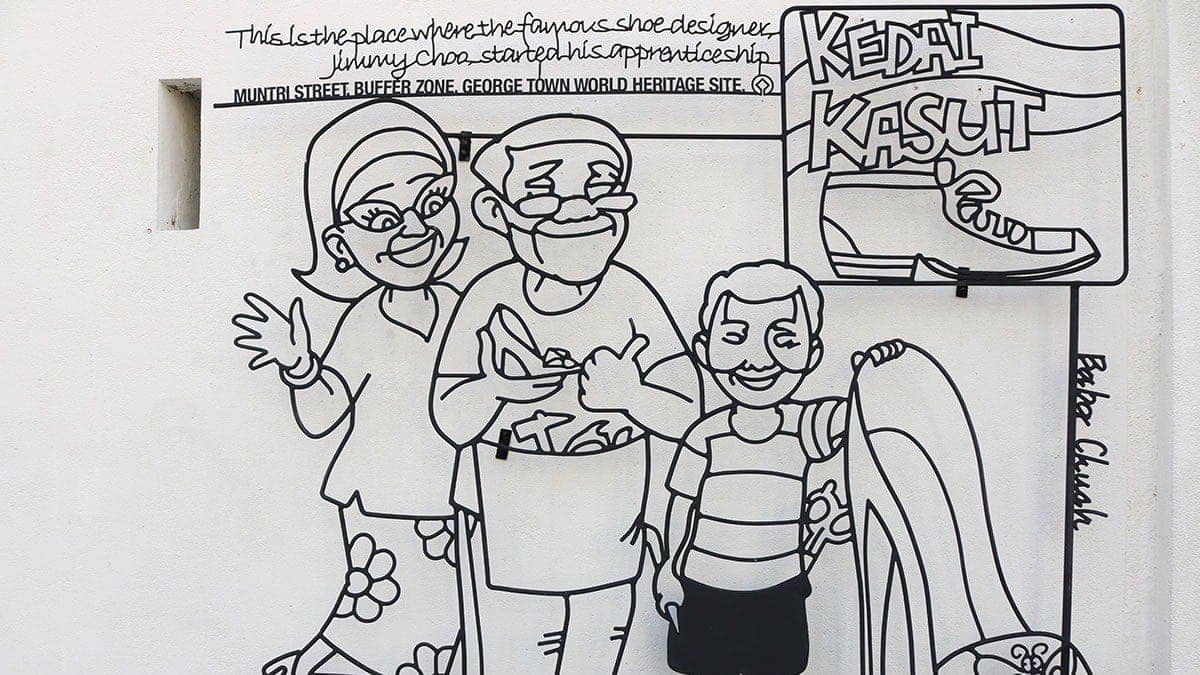
Petronas towers tallest twin buildings in the world
The famous and iconic Petronas Towers in Kuala Lumpur are the world's tallest twin building, standing proud at 452 metres (1,483 feet) high.
In fact, the Petronas Towers used to be the world's tallest building from when it opened in 1998 until 2004. From 2004 onwards, a skyscraper boom took place around the world and taller buildings were built in the UAE, China, Saudi Arabia, USA, Taiwan and Hong Kong, knocking the Petronas Towers to 19th place.
The 2 buildings are joined by a sky bridge at level 41, which is 170m (558 feet) high and home to Petronas, the national oil company.
The Petronas Towers is one of the most iconic buildings of the Kuala Lumpur city skyline along with the Menara communications tower. Whether it's 19th place or 1st place, you can't beat the views. We recommend going to the Skybridge that links the two structures together between the 41st and 42nd floors, which is 170 metres (558ft) high.
Also, be sure to watch the 1999 Hollywood movie “Entrapment” with Catherine Zeta-Jones and Sean Connery, which is largely set in and around the Petronas Towers.

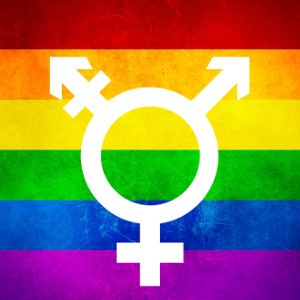
Advice for LGBTQ travellers to Malaysia
It is illegal to be gay in Malaysia! The colonial anti-gay laws are still very much in place here sadly. Whilst they are rarely enforced, this does mean that society retains an air of hostility towards our LGBTQ family. We advise against public displays of affection and any activism in Malaysia. There is however a large and active LGBTQ community and an open gay scene in the larger cities, particularly in Kuala Lumpur.
For more about our adventures through Malaysia, watch out our Malaysia travel video:
Happy travels are safe travels
We recommend you always take out travel insurance before your next vacation. What happens if you suffer from illness, injury, theft or a cancellation? With travel insurance, you can have peace of mind and not worry. We love World Nomads travel insurance and have been using it for years. Their comprehensive coverage is second to none and their online claims process is very user friendly.
Some of the links in this post are affiliate links. This means that if you book your accommodation, an activity or your insurance, we’ll earn a small commission. There is never an extra cost to you for using these links and it helps us keep the site going.
The post 10 interesting facts about Malaysia appeared first on Nomadic Boys.